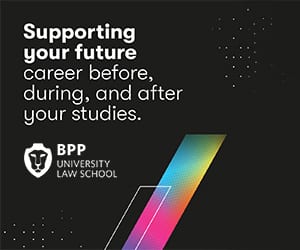
Jun 05, 2019
Written By Coventry University Careers Service
A guide to legal work experience
Jun 05, 2019
Written By Coventry University Careers Service
Legal work experience is a highly recommended course of action when considering a career in law. Have a read to understand exactly what a legal work experience consists of, and how it could work for you.
The legal sector is an extremely competitive occupational area. In addition to the sheer number of law undergraduates each year, graduates from non-law degree courses are able to convert to law.
In order to succeed in such an over-subscribed environment, all students must have:
· Top academic marks
· Determination and dedication
· Plenty of legal work experience
Legal work experience should be undertaken preferably prior to university and definitely during your studies. This is just one way of convincing recruiters that you have a genuine interest in pursuing a career in this sector.
(If you're looking for a list of opportunities, head over to our Vacation Schemes section.)
Informal legal work experience...
This looks good on any UCAS application, or application for a conversion course if you’ve graduated with a non-law degree.
Work experience provides an opportunity to develop key skills, such as working in a team, networking and working on your interpersonal skills – all relevant to a career in this sector.
The core of any experience will focus around shadowing. By going along to a legal firm's premises you are in an excellent position to observe the day-to-day work of the staff and the legal firm in question.
You can chat with employees about their roles and areas of legal expertise, the range of activities they undertake and the skills they use. This is an ideal opportunity to develop a network of contacts.
Crucially, as well as giving you something to talk about on an application form, this is an ideal opportunity for you to decide whether a career in the legal sector is for you.
A speculative approach...
You can get work experience by taking a speculative approach. This means contacting legal firms directly, to find out if they have any opportunities for work experience. This can be done by:
· Telephone
· Visiting the premises of an organisation
· Chatting on a face-to-face basis with a member of staff
· By sending a CV and a cover letter.
Formal legal work experience...
During your degree or conversion course, you should be aiming to undertake:
· Vacation schemes: these take place during the main university holidays and will vary in length and range of work covered depending on the type of organisation, its size, focus and location.
· Pro bono work: this provides a great opportunity to gain experience in the legal sector as you will have direct contact with clients. It also demonstrates a commitment to the profession.
· Mini-pupillages: these allow you to shadow a barrister in chambers for one or two weeks. The range of activities will reflect the barrister's practice and their caseloads.
Recruitment processes...
Formal work experience opportunities usually have specific recruitment processes, which may include completing:
· CV
· Online application
· Assessment centre activities
· Interviews.
More and more recruiters are using these formal schemes to recruit for training contracts.
Firms place varying importance on different skills and competencies, so the key to securing your formal work experience is knowing what the legal recruiter is looking for and successfully matching yourself to those requirements.
The benefit of formal work experience is that it can help you decide which area you want to specialise in and it enables you to put into practice the academic theory studied during your degree.
Legal firms vary in size, from national and regional firms to high street and international firms. They also practise law in every field imaginable, from criminal law to intellectual property and personal injury to real estate.
Legal Work Experience

